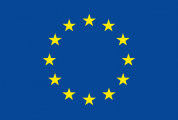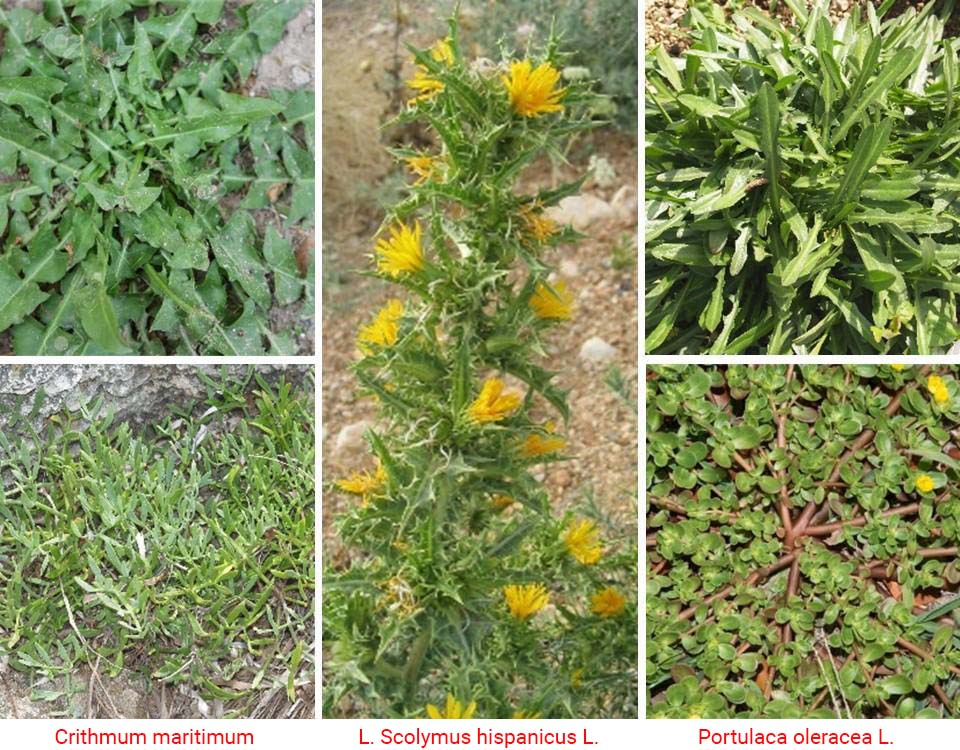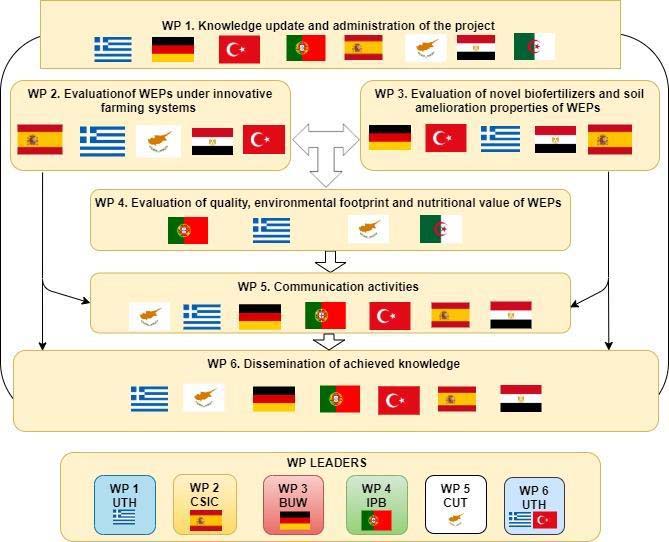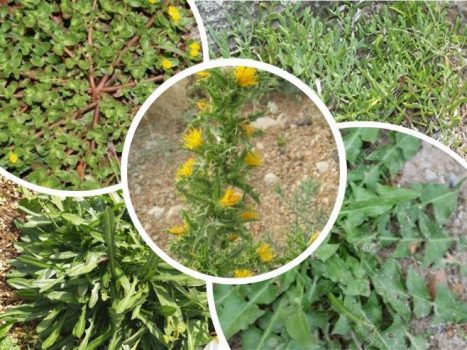

ValueFarm
ValueFarm is a 3-year project and aims to valorize Mediterranean small farms by introducing wild edible plants of the Mediterranean (WEPs) such as Crithmum maritimum L., Portulaca oleracea L., Sonchus sp., Scolymus hispanicus L., and Cichorium spinosum L. as complementary crops within a competitive farming sector and a climate-changing world and cropping them in a sustainable point of view. The assessment of using WEPs in arduous conditions (drought and salinity stress) and marginal soils with low organic matter, compacted, or eroded where conventional crops cannot be cultivated will also be carried out. Moreover, the contribution of WEPs cultivation to soil properties improvement will be assessed by reducing or eradicating the use of agrochemicals, and by introducing the use of a more sustainable agriculture with biostimulants, biofertilizers and biopesticides and the use of tailored composts.
Finally, the selected WEPs will be assessed for their nutritional value and bioactive compounds content in order to select and propose those farming systems that increase the quality of the final product and its added value.
Sonchus oleaceous L. Cichorium spinosum L.

Main objectives
he key objectives of the ValueFarm project are summarized as follows: 1) to propagate and cultivate selected WEPs species, 2) to describe and evaluate agronomic performance of WEPs through laboratory-based research and farm experimentation in order to establish best practice guides of plant requirements with respect to mineral nutrition, soil and climate, environmental footprint (low GHG emissions, water and energy use), 3) to evaluate the potential of cultivating WEPs in degraded soils and assess their soil improvement properties, 4) to diversify existing farming systems from monocropping to agroecological systems rich in diversity through the incorporation of WEPs in mixed and intercropping systems and crop rotation programs combined with legumes, 5) to evaluate innovative approaches (biofertilizers, biostimulants or tailored composts that include beneficial microorganisms plant growth-promoting rhizobacteria (PGPR); plant growth-promoting fungi (PGPF); arbuscular mycorrhizal fungi (AMF)), 6) to analyze chemical composition, nutritional value and bioactive compounds content of WEPs, 7) to increase knowledge and public awareness on the nutritional value and the bioactive compounds content of WEPs, as well as on their environmental impact (resistance/tolerance to drought and salinity stress factors), 8) to create physical labs through a network of farmers for the on-farm demonstration and to implement living lab platforms for technological transfer in each zone of the project of the obtained key results, both of which will facilitate the adaptation of Mediterranean small-scale farms to the proposed farming systems.
The described aims are in line with Goal 2 of the EU 2020 and 2030 Agenda for Sustainable Development, and intend to support agricultural growth in developing countries, with a focus on small-scale farmers and promote sustainable agricultural practices.
Expected impacts
The expected impacts of VALUEFARM are summarized in the following:
1The exploitation of WEPs in innovative farming systems
2The compilation of best practice guides regarding the cultivation of WEPs within the context of small-scale farming under diverse environmental conditions in order to assist farming management in regions and climates where conventional crops are difficult or unprofitable to grow
3The improvement of soil quality in small scale farms through sustainable farming techniques
4The adaptation of small-scale farming sector to the ongoing climate change with the adoption of alternative/complementary crops acclimatized to arduous conditions (water shortage, salinity, soil degradation) and redesigned farming systems tailor-made to small-scale farm needs and resilient to climate uncertainties
5The documentation of nutritional and chemical composition of WEPs so as to facilitate their further exploitation in pharmaceutics and cosmetics, in the design of “healthy” and “functional foods” and the better establishment of the so-called “Mediterranean diet”
6The definitive evaluation of the environmental footprint, climatic and soil requirements of WEPs under small-farm scale cultivation, focusing on their potential use as ameliorative species (e.g. in mixed-cropping, inter-cropping, successive cropping, crop rotation) and the sustainability of agro-ecosystems through the decrease of synthetic inputs, the optimized use of natural resources and circular bio-economy principles
7The demonstration and sharing of the created innovation with on-farm activities and the establishment of physical and living labs so as to allow integration and adoption of innovation among the targeted stakeholders during and after the completion of the project.
Benefits
The benefits that will emerge from the implementation of the ValueFarm project will be:
a) the introduction of innovative and redesigned farming systems with high adaptability under the Mediterranean climate conditions and high use efficiency of natural resources
b) the valorization of food products with regional trademark, being complementary to the main framework for increased competitiveness of Mediterranean agricultural products and the small-scale farming sector
c) the exploitation of WEPs of the Mediterranean flora with special nutritional and pharmaceutical properties for the end-users
d) the re-activation of young population in the farming sector and the reversion of land abandonment trends
e) the evaluation of selected WEPs as potential soil improving species
f) the decrease of environmental burden through the introduction of sustainable farming systems
g) the better establishment of the so-called “Mediterranean diet” in public awareness.
Work packages
ValueFarm is divided in six working packages (WP) and are interconnected as shown in Figure 1:
WP 1. Knowledge update and administration of the project
WP 2. Evaluation of WEPs under innovative farming systems
WP 3. Evaluation of novel biofertilizers and soil amelioration properties of WEPs
WP 4. Evaluation of quality, environmental footprint and nutritional value of WEPs
WP 5. Communication activities
WP 6. Dissemination of achieved knowledge

Figure 1. The conceptual approach of VALUEFARM.
Participants:
- University of Thessaly (UTH), Greece
- Instituto Politécnico de Bragança (IPB), Portugal
- Cyprus University of Technology (CUT), Cyprus
- Dokuz Eylul University (DEU), Turkey
- Ege University (EGE), Turkey
- Consejo Superior de Investigaciones Científicas (CSIC), Spain
- Bergische Wuppertal University (BUW), Germany
- Greek Fresh Vegetables IKE (GFV), Greece
- Benha University (BU), Egypt
- University of Mostaganem (UM), Algeria
Contact details:
Assoc. Prof. Spyridon Petropoulos,
University of Thessaly, School of Agricultural Sciences, Fytokou Street, 38446, Volos, Greece.
Tel: +30-2421093196;
Εmail: spetropoulos@agr.uth.gr

